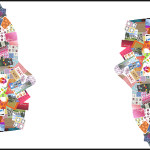
Ben Fishel introduced his post (below) on opinions by saying that the quarantine seems to have made people more opinionated. I agree… but then there is a lot going on to have an opinion about.
The thought of Yugoslavia has come to mind, repeatedly. I know, I agree, strange. But I loved that country – traveled the full length of it right after Tito died. Then all hell broke loose in the 90’s. Neighbors turned on neighbors and families that had intermarried thought it was reasonable to kill each other – because of their different ethnic roots.
My opinion of what took place? It seemed irrational. Their opinion? Being different was reason to die.
My opinion right now? We need to lighten up in this country and focus on what we have in common. Being opinionated usually means being inflexible. It is not hard to make up facts if you know how to do it. It is easy to refuse to accept new “facts” when in love with the old ones.
We all should be weary.
How to Stop Getting Bothered by Strong Opinions
By Ben Fishel
I’m about to say something that might seem surprising.
But I truly believe what I’m about to say, so I’m going to say it.
I’m in the process of getting over an addiction.
It’s a very common addiction, and like all addictions, it’s something that serves a purpose. That purpose, however, is not a sense of peace, contentment and wellbeing. The drive behind this addiction, at least it seems, has been to lull me into a false sense of security.
It isn’t a physical addiction, like drugs or sex or food, it’s a psychological addiction.
I am psychologically addicted to opinions.
And I’m not the only one. Everywhere I look, people cling tightly to their opinions like a chain smoker taking that last puff before a long-haul flight, or an overbearing and jealous partner not wanting to let go, or like Gollum, obsessively guarding his precious ring.
Coronavirus conspiracies? Precious. Trump supporters? Precious. Anti-Trump supporters? Precious. Astrological natal charts? Vegan diets? Gun rights? Preciouuuuuus.
But why do we have such strong opinions?
I have no idea, honestly. As far as I can tell it’s some sort of interaction between an evolutionary coping mechanism and a cultural and technological landscape that rewards strongly opinionated thinking. In other words: opinions are viral.
Let me explain. Do you know what a meme is? You may think it’s just those silly little images with quirky captions that go around the internet. It’s actually a term coined in 1976 by the well-known evolutionary biologist Richard Dawkins. Dawkins used the term to refer to a cultural phenomenon that replicates in a way similar to genes.
In an interview with Wired UK whereby they asked him what he thought of the “new” use of the term. Dawkins replied:
“The meaning is not that far away from the original. It’s anything that goes viral. In the original introduction to the word meme in the last chapter of The Selfish Gene, I did actually use the metaphor of a virus. So when anybody talks about something going viral on the internet, that is exactly what a meme is and it looks as though the word has been appropriated for a subset of that.”
Opinions are, therefore, a type of meme. The nature and structure of the internet seems to fuel polarising attitudes.
Anonymity. We can hide behind a fake name and profile picture, saying whatever we want without repercussions.
Confirmation bias. Our mind naturally looks for other people who share our perspectives and we tend to form groups with them.
Positive Reinforcement. Others who share our opinions will give us social approval that costs them next to nothing and gives us the illusion that our opinions have significant value.
Rapid popularity. Fame and status used to be earned through trial by combat – either physical or psychological. With the internet, individuals who are entirely unprepared for the responsibility of influence are made famous overnight.
People look for opinions to manage their fear of uncertainty, they then look for opinions that match theirs (confirmation bias) in order reinforce this false sense of security, and double down by creating digital in-groups and out-groups.
Whether we know it or not, we are rewarded for our opinions. This reward is a short-term dopamine spike in response to likes, retweets or other forms of social approval.
This is all fine and dandy. But these rewards tend to obscure our perspective. My hunch (also an opinion), is that the validation that many of us crave and receive over the internet is causing us to greatly overvalue our opinions and become entrapped by them.
How to let go of strong opinions?
Opinions are like street signs, but most of us use them like houses. Look at them periodically for guidance, but do not live in them.
I might feel that my own opinions are special. I’ll argue that they’re relatively well thought out, educated, and from a place of less emotional intensity than those of others. However, they’re still just opinions, and therefore no matter how shiny they may seem, they amount to nothing more than a plastic trophy. Try melting down a plastic trophy and see what it gets you.
It sounds paradoxical, but if you truly want to a sense of certainty don’t hold onto your opinions tighter and tighter. Let them go. See how easy life actually becomes when you’re not marching around with a backpack of passionate beliefs. Question your opinions, challenge them. Try living without them, even if only briefly, and notice how less reactive you become, how light life starts to feel, and how life keeps on going, civilisation doesn’t crumble, and you still manage to get through the day to day.
Take a look at your opinions. Where do they come from? Are they really as special as they feel? Pretty much all of what we think comes about as a result of cultural conditioning. A little perspective goes a long way. Remember the ideas you had as a child, or as a teenager? Beliefs that felt so real and important now seem a little silly. Recognising this, does it make much sense to get caught up in your own opinions?
(…)
We all have one strong opinion that we could loosen our grip on today and we’d travel a little lighter for it.
Write it down. Challenge it. Let it go.
Ben Fishel is an UK author, psychotherapist and the creator of Project Monkey Mind.






























